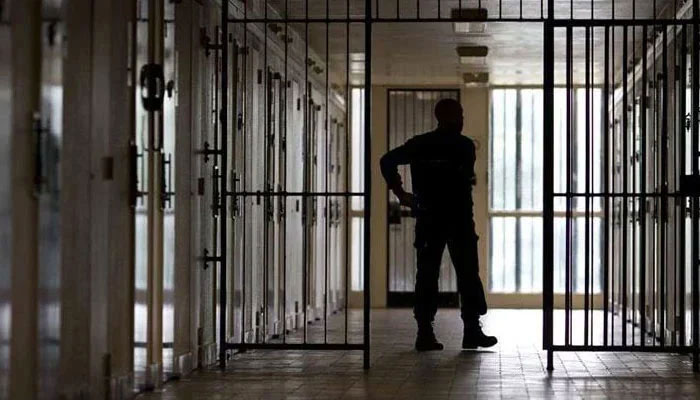2,084 women prisoners in country’s jails, NA told
Minister for Human Rights Azam Nazeer Tarar states women constitute 1.37% of total prison population
ISLAMABAD: The Ministry of Human Rights has submitted a report to the National Assembly, revealing that prison data shows a total of 2,084 women are currently incarcerated across the country for various crimes.
In a written response to a question by Nuzhat Sadiq, Minister for Human Rights Azam Nazeer Tarar stated that women constitute 1.37% of the total prison population in Pakistan. Although, this figure is relatively low compared to global statistics, an upward trend in the number of female prisoners has been observed since 2019. Notably, there has been a 2.8% increase in the number of female prisoners between 2023 and 2024, with most women incarcerated for narcotics-related offences and murder. Currently, Pakistan has four functioning prisons specifically designated for women: three in Sindh (located in Karachi, Hyderabad, and Sukkur) and one in Multan. In other regions, women are housed in separate barracks within male prisons.
The ministry also acknowledged in its written reply that women may face challenges within the criminal justice system. In response, it prepared a report titled “Plight of Women in Pakistan’s Prisons”. The report outlines several key recommendations, including reducing the population of under-trial prisoners, developing sentencing alternatives, establishing post-release programs, and strengthening educational and rehabilitation services. Legal reforms were also emphasized.
Over time, provincial governments have worked to improve prison conditions, ensuring gender non-discrimination, legal representation, and access to rehabilitation services. According to the ministry, women prisoners now have access to all facilities provided under the jail manuals, including medical care, food, legal counsel and vocational training. The development of probation and parole services has also advanced, with data showing that as of 2024, probation services were extended to 190 women in Punjab, nine in Sindh, and six in Khyber Pakhtunkhwa.
The Ministry of Human Rights has taken multiple initiatives to promote gender equality in the justice system and enhance conditions for female offenders. One such initiative is the establishment of the Implementation Commission on Prison Reforms, created under the direction of the Islamabad High Court on November 22, 2019, and led by the minister for Human Rights.
-
 Murder Suspect Kills Himself After Woman Found Dead In Missouri
Murder Suspect Kills Himself After Woman Found Dead In Missouri -
 Sarah Ferguson's Plea To Jeffrey Epstein Exposed In New Files
Sarah Ferguson's Plea To Jeffrey Epstein Exposed In New Files -
 Prince William Prepares For War Against Prince Harry: Nothing Is Off The Table Not Legal Ways Or His Influence
Prince William Prepares For War Against Prince Harry: Nothing Is Off The Table Not Legal Ways Or His Influence -
 'How To Get Away With Murder' Star Karla Souza Is Still Friends With THIS Costar
'How To Get Away With Murder' Star Karla Souza Is Still Friends With THIS Costar -
 Pal Reveals Prince William’s ‘disorienting’ Turmoil Over Kate’s Cancer: ‘You Saw In His Eyes & The Way He Held Himself’
Pal Reveals Prince William’s ‘disorienting’ Turmoil Over Kate’s Cancer: ‘You Saw In His Eyes & The Way He Held Himself’ -
 Poll Reveals Majority Of Americans' Views On Bad Bunny
Poll Reveals Majority Of Americans' Views On Bad Bunny -
 Wiz Khalifa Thanks Aimee Aguilar For 'supporting Though Worst' After Dad's Death
Wiz Khalifa Thanks Aimee Aguilar For 'supporting Though Worst' After Dad's Death -
 Man Convicted After DNA Links Him To 20-year-old Rape Case
Man Convicted After DNA Links Him To 20-year-old Rape Case -
 Royal Expert Shares Update In Kate Middleton's Relationship With Princess Eugenie, Beatrice
Royal Expert Shares Update In Kate Middleton's Relationship With Princess Eugenie, Beatrice -
 Andrew Mountbatten-Windsor’s Leaves King Charles With No Choice: ‘Its’ Not Business As Usual’
Andrew Mountbatten-Windsor’s Leaves King Charles With No Choice: ‘Its’ Not Business As Usual’ -
 Dua Lipa Wishes Her 'always And Forever' Callum Turner Happy Birthday
Dua Lipa Wishes Her 'always And Forever' Callum Turner Happy Birthday -
 Police Dressed As Money Heist, Captain America Raid Mobile Theft At Carnival
Police Dressed As Money Heist, Captain America Raid Mobile Theft At Carnival -
 Winter Olympics 2026: Top Contenders Poised To Win Gold In Women’s Figure Skating
Winter Olympics 2026: Top Contenders Poised To Win Gold In Women’s Figure Skating -
 Inside The Moment King Charles Put Prince William In His Place For Speaking Against Andrew
Inside The Moment King Charles Put Prince William In His Place For Speaking Against Andrew -
 Will AI Take Your Job After Graduation? Here’s What Research Really Says
Will AI Take Your Job After Graduation? Here’s What Research Really Says -
 California Cop Accused Of Using Bogus 911 Calls To Reach Ex-partner
California Cop Accused Of Using Bogus 911 Calls To Reach Ex-partner




